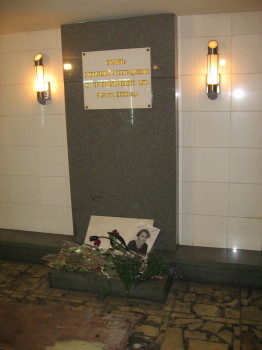Who Won, Who Lost the Cold War?
When walking along Moscow's streets immediately after the Soviet Union collapsed, I saw considerable disorder. Panic buying had emptied the stores. Russians who hadn't grown their own food during the summer lined the subway entrances begging. Many people seemed afraid and petty criminals were becoming brazen. Russia tottered on the edge of lawlessness and so the gatherers began losing out to the hunters. But, there were no ruins, no occupying armies in post-Cold War Russia.
To insist that no side wins a war, that winners just lose less, might seem banal; yet that's why wise political leaders use war as a last resort. War is not diplomacy by another means, but the failure of or disregard for diplomacy. So if the USSR lost the Cold War, what price did they pay and who won?
Leafing through a 20-year old copy of Soviet Military Power, the Pentagon's slick description of the Soviet military threat, I'm still startled by the Soviet arms buildup. No trouble finding WMDs in the USSR. Like the sorcerer's apprentice, when Soviet officials ramped up production, their chemical, biological and nuclear weapons kept pouring out. The USSR was always on a war footing.
Russians and Americans never used their WMDs against each other. Hot battles occurred in Vietnam and Afghanistan, but no direct, catastrophic, total shoot-out and no use of the unthinkable. Monuments dedicated to fallen soldiers in both countries testify to tragic losses, but not the end of a war.
During the half-century of Cold War some Americans wondered if civil liberties needed restricting to further the war effort. Wars, even cold ones, scar democratic institutions. President Lincoln repealed habeas corpus during the American civil war. Some governments in the United States banned the German language from public schools during World War I and dispossessed Japanese-Americans during World War II.
Vanderbilt University's First Amendment Center recently found through its opinion polling that over one-third of Americans couldn't name even one of the five freedoms guaranteed by the First Amendment. Is this a Cold War loss?
Preserving civil liberties during the Cold War wasn't an issue in the USSR. Russians only got them once the war ended. Recently a group of Russian Communists stood by Moscow's Pushkin Metro station and waved their red flags, loudly demonstrating against Russia's new market economy. A smaller group of atheists followed afterwards, holding signs protesting the Russian Orthodox Church's introduction of religion classes into the public schools. Onlookers gawked and police kept traffic moving.
War wastes resources and the Cold War was especially wasteful. Russians and Americans still spend huge sums to destroy useless stocks of Cold War weapons and clean up toxic sites.
After the Cold War, Russia drastically cut its military expenditures even though these cuts idled large factories and caused severe economic shocks. Russia still has the weaponry to dissuade any foreign country from attacking, so why spend huge sums?

Russia has suffered over ten terrorist attacks since the USSR's collapse, but its leaders don't see returning to Cold War military spending levels as a solution. (The photo to the right shows the monument to the 11 people who died in the August 2000 terrorist bombing near the Pushkin Metro station.)
Russian leaders prefer to improve infrastructure, housing, schools and the social safety net. International experts estimate that Russia now spends only $18 billion annually on its military, or about 4 per cent of the total US expenditures. That amount wouldn't even fund 3 months of what the United States spends on the Iraq war.
Perhaps there was no single winner and loser in the Cold War. The U.S. and allied containment of an aggressive USSR was a great achievement, but it was a victory for both sides. As a result, Russians now enjoy broad civil liberties and an unprecedented possibility to develop the wealth of their country. It's hard to see that as a loss.
More troubling, the post-Cold War period finds the United States tumbling back into another war, the war on terror. Defense and other national security spending appear to be a structural part of its economy, with more always meaning better. Some leaders are insisting again on the need to restrict civil liberties to win this war.
Perhaps the significant question is not: "Who won the Cold War?" Maybe we should ask: "Who is winning the peace?"